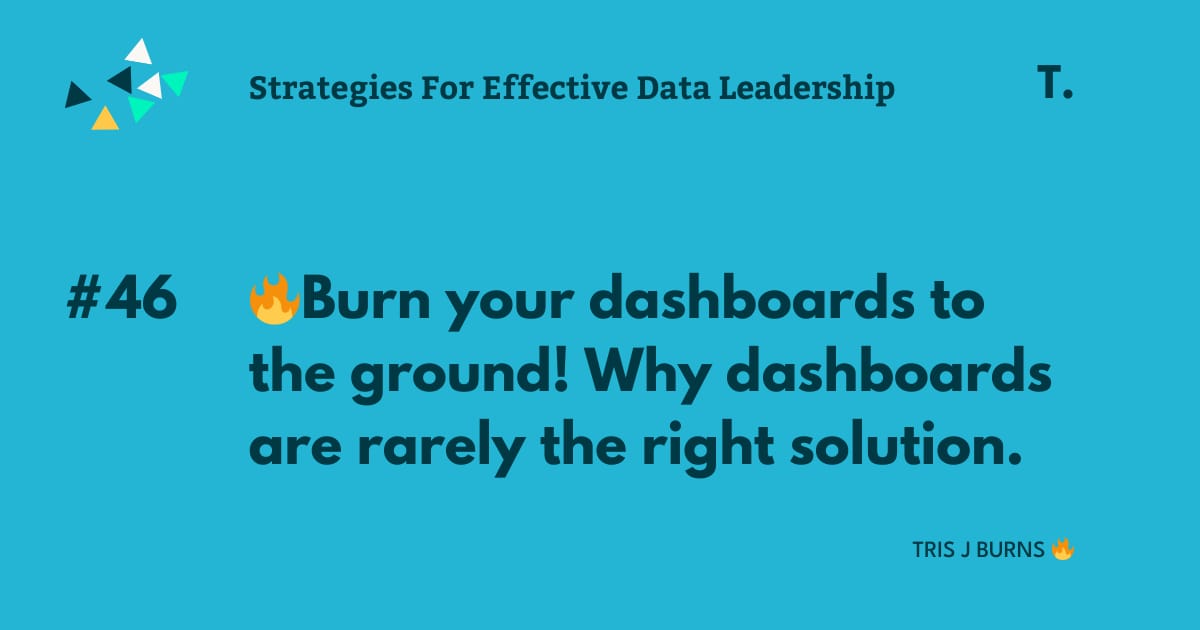
READ TIME: 4 MINUTES
👀 Dashboards are a distraction.
BI SaaS sales people have done a phenomenal job. 👏🏻
They’ve made the data industry focus on an endless stream of new tools and tech (which they of course sell) at the expense of doing our actual jobs:
👉🏼 Using analysis to uncover business problems and opportunities so that we can advise and make commercial recommendations in the businesses we work.
They’ve convinced data people and business leaders alike that in order to be data driven, you need to collect and look at as much data as possible, at all times.
➡️ Enter the dashboard ⬅️
Data teams the world over right now are building and maintaining 1,000s of dashboards their companies are gathering practically 0 benefit from.
Whilst some dashboards are useful and dare I say, essential, the vast majority of them are useless distractions.
Any data professional who wants to lead their organisation towards the sacred land of “data driven” would do well to reevaluate their relationship with dashboards.
The sad truth is that most of you won’t realise this. You’ll read this and nod along in agreement with me and then go back to your work, building another pointless dashboard for the finance team.
But if your goals as a data professional are to become a strategic and influential powerhouse, then you might want to put down the dashboard and back away.

It’s almost Halloween, so why not some ‘The Shining’?
🤒 Dashboards are a symptom of a sick data org.
Multitudes of dashboards are the result of a reactive data organisation that has little in the way of a data strategy, that is seen more as a service desk and provider of information for the business then they are as a strategic partner.
The impacts of this dynamic are numerous, but here are a few:
Data teams are hyper occupied with building and maintaining dashboards that they can’t set their focus on other, more value add work.
Dashboards aren’t looked at by stakeholders nearly as much as we expect and so a lot of energy is wasted.
Dashboards provide us with no end to end visibility of how data is used by stakeholders in the decision making process (and there what value is generated)
They are prioritised by data teams as a tangible representation of the work they do whilst move strategic, longer term work is ignored as it is less visible.
Don’t get me wrong, dashboards can be tremendously powerful and useful tools. But they need to be a part of a wider strategic approach - rather than the go to solution for every single data problem that comes our way.
To achieve this requires a mindset shift. 👇🏻
🛠️ A solution looking for a problem.
If you have plans on being a strategic partner for the business, you need to get out of the ‘dashboard factory’ mindset.
While it might seem like you’re providing tangible value to the business by building the dashboard products they’ve requested, you’re actually harming your future career prospects as well as the businesses ability to gather value from data.
By treating dashboards as the ‘go-to’ solution for any and all data challenges, you actually de-value them and limit your ability to add any value.
Dashboards are ‘a solution looking for a problem’.
❌ Don’t start with solutions
✅ Start with problems
This is how:
Speak to your stakeholders in terms of the problems they are experiencing rather than the solution they’d like you to build them.
Investigate the problem and explore any and all peripheral opportunities that you uncover.
Explore all avenues and arrive at the appropriate solution for that problem and present your findings back to the stakeholder in terms of value, impact and action.
You’ll soon realise that you may not need a dashboard at all!
That’s how you become a strategic partner!
✨ Introducing my new Data Leadership Frameworks ✨
The ultimate guide to powering forward in your data leadership career. This self paced email series contains 10 value-packed frameworks, each tackling and tearing down major data leadership challenges.
Currently £49.00!
10% OFF with checkout code: FRAMEWORK10 - until Friday at Midnight!
By the end of the series you will have covered topics including:
How to create and formalise a more effective data intake process
Strategies for becoming a better presenter to non-data audiences
Developing a data strategy that aligns with your organisations overall strategy
Becoming a powerhouse at selling your data teams wins and accomplishments
Click here to learn more!

Tristan Burns
💡 Helpful resources for data professionals:
The Data Leadership Frameworks: This email series containing 10 data leadership frameworks, will equip you with the necessary skills and knowledge to maximise your effectiveness and become the influential and powerful data leader you know you can be.
DIY Coaching Program: Through a series of 9 self-guided exercises, you’ll clarify your goals, overcome obstacles, and create a plan for your next career move - all at your own pace.
⚡️Three more ways I can help you:
Private Coaching for Data Leaders: I work with data professionals looking to grow into influential and unstoppable data leaders to help them navigate and overcome the challenges of being a data leader.
Group coaching for Data Teams: Great data teams can make or break businesses. Through my facilitated 6-week group coaching program, together we get to the heart of what is holding teams back and set a course for data-driven success.
Google Analytics, Tagging and Looker Support: Helping teams to set up or optimising their data eco system, generate actionable insights and gain more in-depth knowledge through training.
What did you think of this email?
If you enjoyed this newsletter, why not forward it to a friend.
Did someone forward you this email? You can subscribe to Strategies for Effective Data Leaders here!
